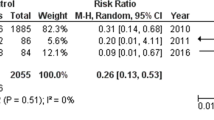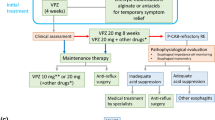Abstract
Purpose
To assess the influence of gut microbiome on overactive bladder (OAB) symptoms progression.
Methods
This was a 3-year longitudinal study, Hirosaki in Japan. We assessed OAB symptoms and reviewed the medication records of each subject in 2016. We extracted 16S rRNA genes from fecal samples and analyzed gut microbiomes via next-generation sequencing. We evaluated the changes in urinary urgency (UU) and/or urgent urinary incontinence (UUI) from 2016 to 2019. We defined UU/UUI-progression as exacerbation of UU and/or UUI. We compared the clinical backgrounds and microbiota structure between UU/UUI-progression subjects and non-progression (controls). We assessed the impact of gut microbiome on the UU/UUI-progression via multivariate logistic regression analyses.
Results
Of 669 subjects, 126 were UU/UUI-progression subjects. These subjects had a higher age and prevalence of proton pump inhibitor (PPI) use (14% vs. 5.4%, P = 0.003), irritable bowel syndrome, sleep disturbance, and metabolic syndrome than those without. We found the different microbiota structures between subjects with UU/UUI-progression and those without. A higher relative abundance of genus Streptococcus (harmful bacterial genus for human health) appeared in UU/UUI-progression subjects (3.8% vs. 2.3%, P < 0.001). Multivariate analysis revealed that age ≥ 65 years, current smoking, sleep disturbance, metabolic syndrome, and genus Streptococcus (Odds ratio: 1.05, P = 0.029) were independent risk factors for UU/UUI-progression. PPI use turned to be a significant risk factor on a multivariate analysis without including genus Streptococcus.
Conclusions
Gut microbiome might be associated with a risk for OAB symptoms progression. PPI use might cause gut dysbiosis and increase this risk.



Similar content being viewed by others
Data availability
The datasets generated during and/or analyzed during this study are available from the corresponding author on reasonable request.
References
Leron E, Weintraub AY, Mastrolia SA, Schwarzman P (2018) Overactive bladder syndrome: evaluation and management. Curr Urol 11(3):117–125. https://doi.org/10.1159/000447205
Barlow GM, Yu A, Mathur R (2015) Role of the gut microbiome in obesity and diabetes mellitus. Nutr Clin Pract 30(6):787–797. https://doi.org/10.1177/0884533615609896
Yin J, Liao S-X, He Y et al (2015) Dysbiosis of gut microbiota with reduced trimethylamine-N-Oxide level in patients with large-artery atherosclerotic stroke or transient ischemic attack. J Am Heart Assoc. https://doi.org/10.1161/JAHA.115.002699
Kanbay M, Onal EM, Afsar B et al (2018) The crosstalk of gut microbiota and chronic kidney disease: role of inflammation, proteinuria, hypertension, and diabetes mellitus. Int Urol Nephrol 50(8):1453–1466. https://doi.org/10.1007/s11255-018-1873-2
Matsumoto H, Shiotani A, Katsumata R et al (2021) Mucosa-associated microbiota in patients with irritable bowel syndrome: a comparison of subtypes. Digestion 102(1):49–56. https://doi.org/10.1159/000512167
Okamoto T, Hatakeyama S, Imai A et al (2020) Altered gut microbiome associated with overactive bladder and daily urinary urgency. World J Urol (Published Online). https://doi.org/10.1007/s00345-020-03243-7
Matsuo S, Imai E, Horio M et al (2009) Revised equations for estimated GFR from serum creatinine in Japan. Am J Kidney Dis 53(6):982–992. https://doi.org/10.1053/j.ajkd.2008.12.034
Kanazawa M, Palsson OS, Thiwan SIM et al (2008) Contributions of pain sensitivity and colonic motility to IBS symptom severity and predominant bowel habits. Am J Gastroenterol 103(10):2550–2561. https://doi.org/10.1111/j.1572-0241.2008.02066.x
Urashima M, Wada T, Fukumoto T et al (2005) Prevalence of metabolic syndrome in a 22, 892 Japanese Population and Japan. Med Assoc J 48(9):441–450
Kido K, Hatakeyama S, Imai A et al (2018) Sleep disturbance has a higher impact on general and mental quality of life reduction than nocturia: results from the community health survey in Japan. Eur Urol Focus. https://doi.org/10.1016/j.euf.2018.04.017
Radloff LS (1977) The CES-D scale. Appl Psychol Meas 1(3):385–401. https://doi.org/10.1177/014662167700100306
Vilagut G, Forero CG, Barbaglia G, Alonso J (2016) Screening for depression in the general population with the center for epidemiologic studies depression (CES-D): a systematic review with meta-analysis. PLoS ONE 11(5):e0155431. https://doi.org/10.1371/journal.pone.0155431
Homma Y, Yoshida M, Seki N et al (2006) Symptom assessment tool for overactive bladder syndrome—overactive bladder symptom score. Urology 68(2):318–323. https://doi.org/10.1016/j.urology.2006.02.042
Holland B, Karr M, Delfino K et al (2019) The effect of the urinary and fecal microbiota on lower urinary tract symptoms measured by the international prostate symptom score: analysis utilizing next-generation sequencing. BJU Int. https://doi.org/10.1111/bju.14972
Bruno G, Zaccari P, Rocco G et al (2019) Proton pump inhibitors and dysbiosis: Current knowledge and aspects to be clarified. World J Gastroenterol 25(22):2706–2719. https://doi.org/10.3748/wjg.v25.i22.2706
De Jager CPC, Wever PC, Gemen EFA et al (2012) Proton pump inhibitor therapy predisposes to community-acquired Streptococcus pneumoniae pneumonia. Aliment Pharmacol Ther 36(10):941–949. https://doi.org/10.1111/apt.12069
Horvath A, Rainer F, Bashir M et al (2019) Biomarkers for oralization during long-term proton pump inhibitor therapy predict survival in cirrhosis. Sci Rep 9(1):1–9. https://doi.org/10.1038/s41598-019-48352-5
Jie Z, Xia H, Zhong S-L et al (2017) The gut microbiome in atherosclerotic cardiovascular disease. Nat Commun 8(1):845. https://doi.org/10.1038/s41467-017-00900-1
Pittayanon R, Lau JT, Yuan Y et al (2019) Gut Microbiota in patients with irritable bowel syndrome-a systematic review. Gastroenterology 157(1):97–108. https://doi.org/10.1053/j.gastro.2019.03.049
Matsumoto S, Hashizume K, Wada N et al (2013) Relationship between overactive bladder and irritable bowel syndrome: a large-scale internet survey in Japan using the overactive bladder symptom score and Rome III criteria. BJU Int 111(4):647–652. https://doi.org/10.1111/j.1464-410X.2012.11591.x
Christianson JA, Liang R, Ustinova EE et al (2007) Convergence of bladder and colon sensory innervation occurs at the primary afferent level. Pain 128(3):235–243. https://doi.org/10.1016/j.pain.2006.09.023
Esan OB, Perera R, McCarthy N, Violato M, Fanshawe TR (2020) Incidence, risk factors, and health service burden of sequelae of campylobacter and non-typhoidal salmonella infections in England, 2000–2015: a retrospective cohort study using linked electronic health records. J Infect 81(2):221–230. https://doi.org/10.1016/j.jinf.2020.05.027
Howden CW, Hunt RH (1987) Relationship between gastric secretion and infection. Gut 28(1):96–107. https://doi.org/10.1136/gut.28.1.96
Wallace JL, Syer S, Denou E et al (2011) Proton pump inhibitors exacerbate NSAID-induced small intestinal injury by inducing dysbiosis. Gastroenterology. https://doi.org/10.1053/j.gastro.2011.06.075
Chey WD, Mody RR, Wu EQ et al (2009) Treatment patterns and symptom control in patients with GERD: US community based survey. Curr Med Res Opin 25(8):1869–1878. https://doi.org/10.1185/03007990903035745
Acknowledgements
We would like to Dr. Atsushi Imai in Oyokyo Kidney Research Institute Hirosaki Hospital, Prof. Shigeyuki Nakaji and the entire staff of the Department of Social Medicine in Hirosaki University for their invaluable help with data collection. JST COI Grant Number JPMJCE1302 supported this work. The authors would also like to thank Enago (www.enago.jp) for the English language review.
Funding
None.
Author information
Authors and Affiliations
Contributions
1) Conception and design of the study: TO, SH, and CO, 2) analysis and interpretation of data: YO, DS, KO, SH and TO, 3) collection and assembly of data: JS, TM, SH, and CO, 4) drafting of the article: YO and TO, 5) critical revision of the article for important intellectual content: SH, and CO, all other authors have contributed to data collection and interpretation and critically reviewed the manuscript. All authors approved the final version of the manuscript and agree to be accountable for all aspects of the work in ensuring that questions related to the accuracy or integrity of any part of the work are appropriately investigated and resolved.
Corresponding author
Ethics declarations
Conflict of interest
The authors have no competing interests.
Ethical approval
Written informed consent was obtained from all subjects. The data we used from the Iwaki Health Promotion Project was approved by the Ethics Committee of Hirosaki University School of Medicine (authorization number 2021-003raH).
Additional information
Publisher's Note
Springer Nature remains neutral with regard to jurisdictional claims in published maps and institutional affiliations.
Supplementary Information
Below is the link to the electronic supplementary material.
Rights and permissions
About this article
Cite this article
Okuyama, Y., Okamoto, T., Sasaki, D. et al. The influence of gut microbiome on progression of overactive bladder symptoms: a community-based 3-year longitudinal study in Aomori, Japan. Int Urol Nephrol 54, 9–16 (2022). https://doi.org/10.1007/s11255-021-03044-w
Received:
Accepted:
Published:
Issue Date:
DOI: https://doi.org/10.1007/s11255-021-03044-w




